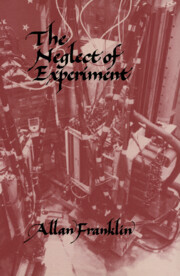Book contents
- Frontmatter
- Contents
- Acknowledgments
- List of abbreviations
- Introduction
- 1 The discovery of parity nonconservation
- 2 The nondiscovery of parity nonconservation
- 3 CP or not CP
- 4 The role of experiment
- 5 Do experiments tell us about the world?
- 6 The epistemology of experiment
- 7 The epistemology of experiment: case studies
- 8 Forging, cooking, trimming, and riding on the bandwagon: fraud in science
- Conclusion
- Notes
- Index
Introduction
Published online by Cambridge University Press: 15 December 2009
- Frontmatter
- Contents
- Acknowledgments
- List of abbreviations
- Introduction
- 1 The discovery of parity nonconservation
- 2 The nondiscovery of parity nonconservation
- 3 CP or not CP
- 4 The role of experiment
- 5 Do experiments tell us about the world?
- 6 The epistemology of experiment
- 7 The epistemology of experiment: case studies
- 8 Forging, cooking, trimming, and riding on the bandwagon: fraud in science
- Conclusion
- Notes
- Index
Summary
One of the great anticlimaxes in all of literature occurs at the end of Shakespeare's Hamlet. On a stage strewn with noble and heroic corpses – Hamlet, Laertes, Claudius, and Gertrude – the ambassadors from England arrive and announce that “Rosencrantz and Guildenstern are dead.” No one cares. A similar reaction might be produced among a group of physicists, or even among historians and philosophers of science, were someone to announce that “Lummer and Pringsheim are dead.” And yet they performed some of the most important experiments in the history of modern physics. It was their work on the spectrum of black-body radiation, along with that of Rubens and Kurlbaum, that showed deviations from Wien's Law and formed an important part of the background to Planck's introduction of quantization.
This is symptomatic of the general neglect of experiment and the dominance of theory in the literature on the history and philosophy of science. In Thomas Kuhn's history of quantization, Black-Body Theory and the Quantum Discontinuity, 1894–1912, Lummer, Pringsheim, Rubens, and Kurlbaum are, at best, peripheral characters. The title indicates what Kuhn thinks is important. We never see what the experimental results were or find a discussion of how they were obtained.
But, it might be said, that is only an isolated case. Surely everyone is aware of the famous experiments of Galileo and the Leaning Tower of Pisa, of Thomas Young's double-slit interference experiment, and of the Michelson–Morley experiment.
- Type
- Chapter
- Information
- The Neglect of Experiment , pp. 1 - 6Publisher: Cambridge University PressPrint publication year: 1986



